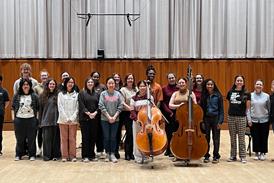- News
- For Subscribers
- Student Hub
- Playing Hub
- Directory
- Lutherie
- Magazine
- Magazine archive
- Whether you're a player, maker, teacher or enthusiast, you'll find ideas and inspiration from leading artists, teachers and luthiers in our archive which features every issue published since January 2010 - available exclusively to subscribers. View the archive.
- Jobs
- Shop
- Podcast
- Contact us
- Subscribe
- School Subscription
- Competitions
- Reviews
- Debate
- Artists
- Accessories
Session Report: Recording Florence Price’s Second Violin Concerto

Violinist Rachel Barton Pine and conductor Jonathon Heyward speak to Harry White about recording Florence Price’s lost-and-found late work, the Second Violin Concerto
Explore more Featured Stories like this in The Strad Playing Hub
Read more premium content for subscribers here
You could easily have forgiven Florence Price had she thrown in the towel at the start of the 1930s. The African–American composer was newly divorced and struggling financially in the aftermath of the Wall Street Crash. Her prospects were looking bleak. But she was not just an extraordinary musical talent – she was an extraordinary personality. Looking back at her career, and in spite of the self-described ‘handicaps… of sex and race’, she could already cite gravity defying leaps in the musical world.
Having graduated with honours from the New England Conservatory of Music in Boston in 1906, aged only 19, she followed up with an appointment as head of music at what is now known as Clark Atlanta University in Atlanta, Georgia. By 1912, she had married the lawyer Thomas J. Price and moved back to her childhood home in Little Rock, Arkansas, spending the next 15 years raising her children alongside teaching and composing. Then everything changed. Growing racial tensions compelled the family to up sticks and go to Chicago. In less than five years her marriage was over and, a single mother in the midst of an economic depression, she was forced to move in with the family of a friend, Margaret Bonds. But by the late summer of 1933, against all the odds, she had claimed first prize in the elite Rodman Wanamaker Contest in Musical Composition for Composers of the Negro Race; her first symphony had been premiered by the Chicago Symphony Orchestra; and the Chicago Daily News had heralded her genius. Six years later, her music was being performed on the steps of the Lincoln Memorial, Washington DC, to an audience exceeding 75,000 and broadcast to millions across the US…
Already subscribed? Please sign in
Subscribe to continue reading…
We’re delighted that you are enjoying our website. For a limited period, you can try an online subscription to The Strad completely free of charge.
* Issues and supplements are available as both print and digital editions. Online subscribers will only receive access to the digital versions.




























